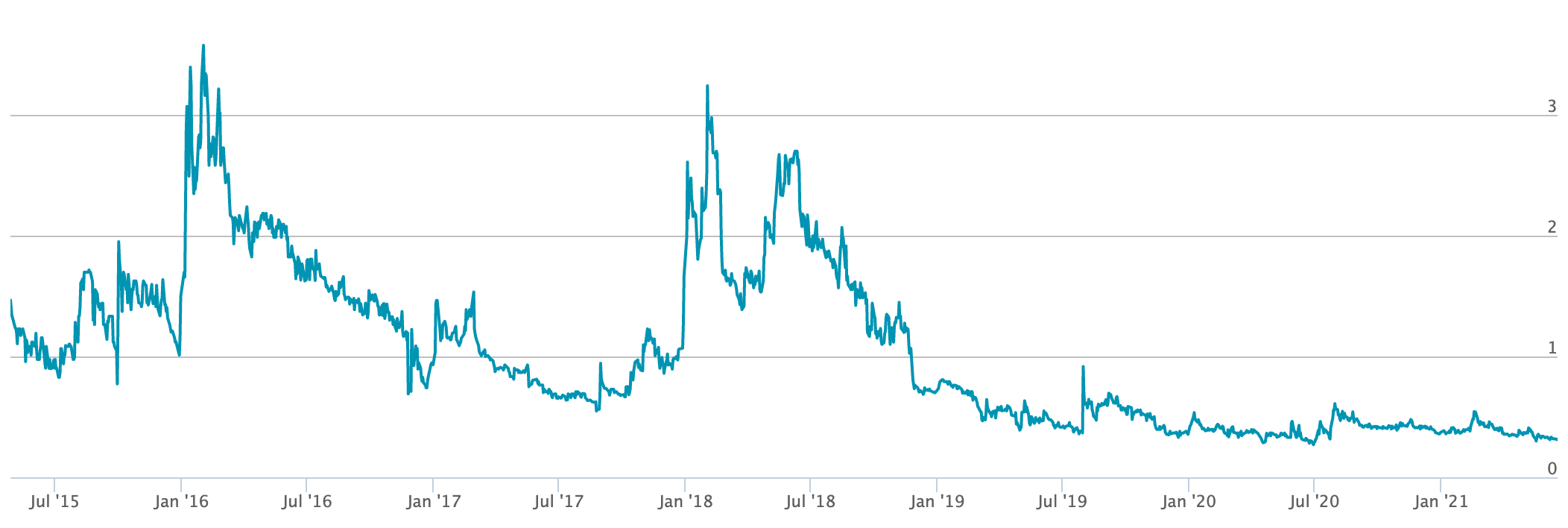Spiffbet's shopping spree

Spiffbet used to be in the business of producing betting software and later on slot machines, but last year they pivoted on operator side. Instead of starting their own, they went on a shopping spree, buying dozen or so existing brands.
Spiffbet has not been on my radar before latest change in business model, so my knowledge of their history is limited to annual reports and their website. Somehow I have mixed feelings. It is clear they have failed at least twice. What was listed on First North, was a company developing betting exchange. In 2018, they started pivoting to slot machines by acquiring games and game developer SHTML Gaming.
As below table illustrates, before pivoting in 2020, the company was tiny. (Numbers rounded for clarity. Handy currency conversion guide: 10 SEK is approx. 1 EUR.)
| Year | Sales, SEK | Result, SEK |
| 2015 | 1 179 000 | -8 733 000 |
| 2016 | 1 470 000 | -10 602 000 |
| 2017 | 1 204 000 | -13 356 000 |
| 2018 | 0 | -11 067 000 |
| 2019 | 1 013 000 | -15 992 000 |
| 2020* | 18 263 000 | -30 656 000 |
Swedes tend to list companies in very early stages. In most countries, companies like Spiffbet, with 100k€ / year sales, simply do not belong in stock exchange - unless they develop experimental drugs, of course. I know how many startup success stories Sweden has, and I'm not exactly criticizing them. Stockholm has produced more unicorns per capita than any other city in the world, and has vibrant startup/entrepreneur-scene with countless smaller success stories.
But was listing on First North the right choice for them? I don't know. Maybe they got financing with better conditions than they otherwise would have gotten. Would I invest in a listed startup with practically no sales? Definitely not.

If you have a private company with direct investments, and the business doesn't work out, most natural way forward is to sell assets to highest bidder and move on. Start another company, sometimes even with the same team. With listed company, biggest asset is the listing itself. It can be used as a vehicle access to financing and providing liquidity to others. And that seems to be exactly what Spiffbet has done.
Their shopping spree consists of following purchases.
- Metal Casino, Q2/2020, ~1M€ (30% of Spiffbet, mcap being ~3M€ then)
- Goliath Casino, Q3/2020, ~260k€ (3,8% of Spiffbet)
- Cashmio, BusterBanks and Supernopea, Q4/2020, ~3M€ (~1M€ in cash, rest in stock)
- Bellis Casino, Q4/2020, 20.5k€ (cash)
- Wishmaker, Q4/2020, estimate 20k€ (performance based deal, 20% of sales during H1/2021. Amount unknown, estimate based on historical sales.)
- Zenspin, Q4/2020, took over for free
- Sir Jackpot and Live Lounge, Q1/2021, ~200k€ in shares (+ ~50k€ performance based part in cash)
- Scandibet and Turbovegas (Manisol Gaming Ltd), Q1/2021, ~2M€ in stock + 900k€ performance bonus + Spiffbet took over ~1M€ debt
I apologize for being rude, but the common nominator among these acquisitions is failure. When it comes to Zenspin or Wishmaker, what happened is obvious from purchase price. Metal Casino was clearly not profitable, and one of the first things Spiffbet did with it was to change it to SkillOnNet platform, which is half the price of every other platform provider.
Bellis Casino looks like a good candidate for serious buyer's remorse. It combines two things I personally would not touch if my life depended on it: Aspire and Denmark. The platform is so outdated that Aspire has given up developing it, pivoting to developing games - very successfully, I must say. There is no advantage to Aspire other than price. It is impossible to offer a competitive product on their platform. Denmark is the worst market to be in. Acquisition is ridiculously expensive and taxes eat whatever slight margin you can make. The only way to even survive is to offer a top notch product, which again, is plain impossible on Aspire. Granted, 20.5k€ is not much to splurge on trying out something new, but it's just a start. Resources and media spend are the issue here, as they will be totally wasted on trying to make it work.
Cashmio is a failure in different sense. Had I built a casino worth 3M€, I'd be a very happy man and would consider myself a succesful entrepreneur. But I also know "through the grapevine" that they sought financing with considerably higher valuation years ago.
I can see how tempting Spiffbet's offer must be from Cashmio's or Manisol's owner's perspective. You're sitting on an asset that is extremely risky and highly illiquid. Becoming big part of listed company reduces risk - there are other brands, more markets etc. - and gives access to resources and capital to execute more ambitious growth plans.
From investor's perspective... I'm sorry to say, but first thing that comes to mind is Dilbert strip about sick cows.

I must admit there's nothing particularly wrong about these casinos, only exception being Bellis Casino. They are solid brands and solid products. I'm not a big fan of the fact that it's very Nordic-focused. Every market in Nordics is oversaturated and over-regulated or soon to be over-regulated. But some brands have already been localized for Japan, New Zealand, Canada etc. - every one more interesting than all of Nordics combined. Making Cashmio succeed in Japan would comfortably double or triple their sales.
My issue is with their strategy. I totally understand why they have done what they have done, but I don't think it'll work. If the current teams were capable of making existing brands profitable, they would've been profitable. What can Spiffbet - essentially a shell company - bring to the table? What is the missing link they can give to those teams so they can change course?
Multi-brand is so popular, because it's a lot cheaper to acquire players to a new brand, for at least a year. This benefit doesn't exist if you buy old brands.
Most successful operators with multi-brand strategy tend to own their own platform and license. They can be agile; launching new brands is quick and cheap. But it's not just about launching. Acquiring players cheap with good volumes will ultimately come to an end. This is not a problem if you have your own platform. Launch another brand to enjoy those new-brand cheap volumes. Continue acquiring players to existing brands for reasonable price - lot less volume, but profitability is still there.
Trying to do the above with someone else's platform and license will only result in fees eating away margins. There are operators who run several white label casinos, but they have lean organizations, often with just few people, and most importantly, with their own acquisition channels. Owning their own channels means they can rely on cheap traffic. Having 50% less profit from optimal situation doesn't matter, as they would not have gotten the remaining half anyway, had they sold their traffic to someone else.
As of writing this, Spiffbet has a market cap of 12M€. I don't really have an opinion on whether or not it's justified. It isn't, if you choose to focus on the fact that the company has failed to make a single penny throughout it's 6-year journey as a listed company. It's very different company now, but latest report still shows -250k€ EBITDA and -650k€ cashflow from operating activities.
One could, I suppose, focus on future potential. For example Angler Gaming - on surface very similar business - has EBITDA margins of about 30%. But it owns its own platform, operates in much more profitable markets, is 4 times bigger business with impressive track record of organic growth, has 10 year history with this exact business model and all the experience that comes with it.
I'm not saying they will not succeed in turning a profit. Both management and employees appear to be seasoned professionals, and like said, there's nothing wrong with their products. Right now, however, there's no proof of being able to turn these casinos profitable or grow them. Most likely path forward, according to CEO, is that next they will acquire something that is already profitable. Sounds like plan, but how much it's diluted before this strategy bears fruit - I don't want to find out.

Comments